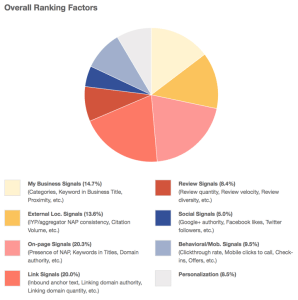Local search is more important than you think.
Whether your business sells products or provides services, local search optimization absolutely needs to be part of your marketing. And the reason why is simple: More consumers now use search engines as a starting point to find information.
Research from Google on local search intent found the following:
- 4 out of 5 of those surveyed indicated using search engines to conduct local searches
- 50 percent of local searches on mobile devices lead to store visits
- 34 percent of local search on computers or tablets lead to store visits
- 18 percent of local searches lead to purchases
Local searches are more likely to lead to sales.
Which is why visibility in the search results is so important.
But the first step is optimizing your site to rank for local keywords. Otherwise you lose potential customers to competing sites that are better optimized. So the question is how do you improve local search rankings?
Google relies on complex algorithms to deliver relevant results. There are hundreds of factors that are carefully evaluated from domain authority to social signals and content. Improving rankings starts with an understanding of these ranking factors and focusing on those aspects.
Here is a breakdown of local search engine ranking factors and how you can use this information to inform your marketing.
Local Search Ranking Factors
The 2015 Local Search Ranking Factors report is a survey that ranks individual ranking factors based on data compiled from leading SEO experts on local search.
Here is what the data looks like:
According to the data, the top ranking factor is On-Page Signals followed closely by Link Signals. Other factors with a major impact on rankings is My Business Signals and External Location Signals. The most important takeaway is that Google is now focusing more on quality.
But what exactly do these “Signals” mean?
Let’s take a look at each one in more detail.
On-Page Signals
On-page optimization continues to be a major ranking factor.
Google looks at certain on-page components to determine relevancy from keyword usage to business information. Without those signals, your site stands little chance of ranking. Implement the following to better optimize your site:
- Include NAP: NAP stands for Name, Address, and Phone Number. Including this information on your pages is absolutely important. Because search engines use this data to determine which sites to display for local searches.
- Optimize titles: Similarly, you want to make sure to optimize page titles to include local keywords such as the city your business is based in. If you target multiple areas, create new pages that are optimized for that keyword.
- Be mobile friendly: Mobile friendliness is now a ranking factor. As more consumers use mobile devices to conduct local searches, your site needs to be mobile friendly.
Link Signals
A link from a relevant source carries a lot of weight in the search engines.
But the key is quality. After all, anyone could manipulate their rankings by simply spamming links to their pages. And doing so will likely get your site penalized in the search results.
Here are ways to build quality links to your site:
- Sponsor a local event or meetup group
- Promote a local resource on your site
- Build relationships with local influencers
- Guest post on related blogs
- Submit to local directories
Whenever possible, optimize the anchor text for each link to include your target keywords (e.g. emergency dentist in Austin, flower delivery in Austin, etc.). This will help to maximize the effectiveness of each link and improve local search rankings.
My Business Signals
My Business Signals includes local search factors that relate to Google My Business. These signals carry a great deal of weight especially for the local search packs.
Here are steps to optimize business signals:
- Verify your site with Google My Business
- Include the correct category for your business
- Keep your physical address consistent
- Add location keywords in the business title
- Include a local phone number and business hours
Ranking for local keywords and ranking for non-local keywords are two different things. You need to take extra steps to verify your business actually exists and optimize your site accordingly for local search.
External Location Signals
Google looks at more than just on-page and link signals to determine rankings.
Another factor it looks at is location signals which are citations from local directories. Quality and consistency should be the primary focus. Quantity only results in diminishing returns.
Here are the steps to get started
- Research: Do searches for your type of business to see which directory sites rank well (e.g. Yelp, Yellow Pages, Angieslist, BBB, etc.
- Submit: Go through each of the sites and submit your site. Each will have their own process but should be relatively straightforward. You will also need to verify that the site is yours.
- Optimize: Consistency is incredibly important. Be sure that the phone number and location you submit are kept the same across all directories. Spend some time here to optimize your profile and include a brief description about your business as well as opening hours and links to your social media pages.
Internet Yellow Pages (IYP) still hold value for local businesses. Most people use Google for local searches, but IYP listings (e.g. Yelp, Yellow Pages, etc.) still appear in the search results. This means additional traffic and a quality link from an established site.
Conclusion
There are numerous other ranking factors such as review signals, social signals, and even behavioral signals. But the ones described above are easily the most important.
Start by optimizing all on-page aspects of your site and include local keywords as well as business information (phone number, address, etc.) within your content. Build quality backlinks to your pages and submit your site to local listings.
Taking these steps will help your business rank higher for local searches.

